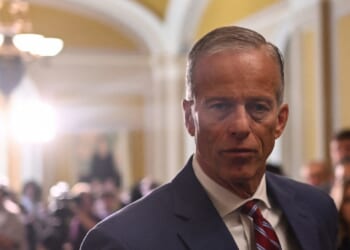Peter Franklin is an Associate Editor of UnHerd.
Last week was a good one for Kemi Badenoch. But this week will be the worst of her political career (so far). Conservative poll ratings are half what they were in 2021, which is when the local seats up for election this Thursday were last contested. Barring a miracle, the party will lose hundreds of councillors and multiple councils.
he impending disaster is mostly not of Badenoch’s making, but that won’t silence those who can’t wait to see her gone. Fortunately, she can rely on the support of the man most likely to succeed her: Robert Jenrick. “I think she’s doing a bloody good job in difficult circumstances” he said on ITV’s Good Morning Britain. “People should give her a break,” he added.
Arguably, they should also give her another year or two, but the biggest reason why they might not is Jenrick himself. You see, the current Tory leader is doubly unfortunate: not only does she have the kakistocratic legacy of her predecessors to contend with, she also has a plausible replacement sitting in her Shadow Cabinet.
That much is made clear by the most recent ConservativeHome league table. The Shadow Justice Secretary is by far the most popular figure on the Tory front bench. Indeed, Henry Hill’s report on the April figures is adorned with an image of Jenrick in laurels – such is the weight of his sixty-point advantage over Badenoch.
But hasn’t every Tory leader had to put up with a popular rival? Well, no. The Badenoch-Jenrick juxtaposition is in fact highly unusual. One can hardly deny the chronic instability at the top of our party, but for the most part this hasn’t been caused by the rivalrous presence of an oven-ready successor. Let me prove it to you.
From 1997 to the present day there have been nine Conservative leaders. The first was William Hague, who was in a remarkably similar position to the current leader. Both came from the centre-right of the party, both had only two years’ experience as cabinet ministers and both took over after a landslide defeat. As for leadership rivals, if Badenoch has Jenrick then Hague had Michael Portillo, who was widely regarded as the more impressive politician.
Another parallel, then – but not an exact one. Portillo had famously lost his seat in the 1997 general election and didn’t return to the Commons until the end of 1999. Thus there were more than two years for Hague to dig in as leader. No such luck for Badenoch.
In any case, when Hague did step down – after losing the 2001 general election – it wasn’t Portillo who became leader, but Iain Duncan Smith. Like Hague, IDS was harried by disloyal colleagues, but not by a declared rival. Indeed, he was replaced in 2003 by Michael Howard, who served more as a caretaker than a genuine leader. As part of this interim phase, internal dissent was suppressed and Howard’s eventual successor – David Cameron – was a protégé, not a rival.
Cameron would get more than a decade as leader, but while his time at the top was long and eventful, active rivals were thin on the ground. The man he defeated for the leadership in 2005, David Davis, might have become a focus for internal dissent, but Davis’s shock decision to force a by-election in his own seat was self-disqualifying. In any case, right-wing opposition to Cameronism became increasingly externalised in the form of Nigel Farage.
At this point we should bring Boris Johnson into the story. Here was someone with the star quality to rival both Cameron and Farage. And yet as Mayor of London from 2008 to 2016, this particular prince was stuck across the water (at least, until the Brexit referendum campaign).
So for most of this period the only other potential leader was George Osborne, but he was Cameron’s closest ally, and as the anointed heir, could afford to wait his turn.
Or so we all thought. The unexpected result of Brexit referendum upended careers all over Westminster. One of the few winners was Theresa May, who became leader after the other leadership campaigns collapsed one by one. Though she faced entrenched opposition to her Brexit policy, credible rivals to her leadership of the party took years to emerge.
Even after the calamity of the 2017 snap election, she clung on to power because no one could think of anybody to replace her with. Johnson had still not recovered from the mysteriously abortive launch of his 2016 leadership campaign and Osborne had made the fatefully premature decision to stand down as an MP.
It wasn’t until 2019 that the party was ready to give Johnson a second chance. However, he wasn’t the cause of May’s downfall – she would have had to resign anyway after the Commons-wide rejection of her Brexit deal. So, once again, we have a tale of Tory disunity, but not one driven by the clash of rival claimants to the throne.
Of course, once he was in power, Johnson found himself constantly undermined by his worst enemy. That person, however, was himself. As much as the diehard Borisites might want to blame Rishi Sunak, it was the own goal of Partygate that destroyed the pandemic prime minister.
Indeed, such was the resistibility of Sunak’s rise to power that party members chose Liz Truss instead. As you may recall, she didn’t last long. I suppose Sunak could have been described as her rival during her brief time in office, but before he could say “I told you so” she was gone.
Sunak lacked rivals during his unsuccessful stint as party leader. As things went from bad to worse, someone could and should have emerged as a “no change, no chance” candidate, but by 2024 his cabinet colleagues had clearly given up the will to fight (and Johnson had already resigned his seat).
And so we arrive back at the present, where Badenoch is unique among the last nine party leaders in having her hotly-tipped successor sat right beside her. One therefore has to ask why they find themselves in this unusually awkward situation.
The root of the problem lies in last year’s leadership contest. This should have settled the matter of who leads (for a few years, at least). After all, that is the purpose of the exercise – i.e. there’s a race, the winner gets the laurels and the losers either knuckle under or go into exile.
Unfortunately, however, the 2024 race was a sham. The arguments that the party desperately needed to have with itself were smothered smothered the name of ‘unity’. Most pathetically, there was the final TV “debate” between Badenoch and Jenrick – in which the candidates never actually debated with one another.
In theory, Badenoch was the chief beneficiary of the stitch-up, but in practice she’s become the biggest loser. Unresolved tension never goes away, it just manifests in another form – in this case, the ongoing compare-and-contrast with Jenrick.
So what can the two of them do about it? Well, in his case, nothing rash. It’s not in his interest to make any sudden moves; indeed his evident inclination is to bide his time, while using it constructively.
Badenoch should also tread carefully. She can’t sack Jenrick, because he’s given her no good reason to do so. She could tighten the leash, insisting that he keeps strictly to his shadow justice brief, but that would make her look weak and insecure. It would also set a terrible example to other shadow cabinet members, who should be encouraged to match Jenrick’s energy and initiative.
Much better, then, to promote him – but what to? A bump up to shadow chancellor, foreign secretary, or home secretary would mean shoving aside useful allies.
The wise and ballsy move would be to make Jenrick deputy leader, a currently vacant position. Once in place, he could be given specific responsibilities for the policy renewal process and for overhauling the party’s campaign operations. That way, his successes become her successes.
If nothing else, managing a potentially fraught but necessary partnership would be useful practice – because if Badenoch can’t handle Jenrick, then what chance does she have with Farage?

![Stephen Miller Announces New Goal for ICE Mass Deportation Effort [WATCH]](https://www.right2024.com/wp-content/uploads/2025/05/Stephen-Miller-Announces-New-Goal-for-ICE-Mass-Deportation-Effort-350x250.jpg)


![Simone Biles Defends Trans Pitcher and Mocks Riley Gaines, It Doesn’t Go Well [WATCH]](https://www.right2024.com/wp-content/uploads/2025/06/Simone-Biles-Defends-Trans-Pitcher-and-Mocks-Riley-Gaines-It-350x250.jpg)

![LAPD Praises 'Peaceful' Rioters as They Set Cars on Fire and Attack Feds [WATCH]](https://www.right2024.com/wp-content/uploads/2025/06/LAPD-Praises-Peaceful-Rioters-as-They-Set-Cars-on-Fire-350x250.jpg)

![Fans Shocked as Katy Perry Stops Concert After She’s Ambushed by Deranged Fan Onstage [WATCH]](https://www.right2024.com/wp-content/uploads/2025/06/Fans-Shocked-as-Katy-Perry-Stops-Concert-After-Shes-Ambushed-350x250.jpg)
![LA Protest Casualty? Dead Body Found as Riots Stretch Into Fifth Night [WATCH]](https://www.right2024.com/wp-content/uploads/2025/06/1749642627_LA-Protest-Casualty-Dead-Body-Found-as-Riots-Stretch-Into-350x250.jpg)






